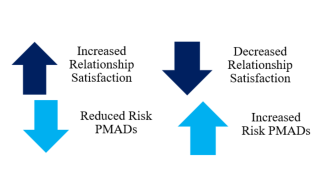Parenting
When Couples Become Parents: The Impact on Your Relationship
Is your relationship ready for the transition to new parenthood?
Posted March 9, 2023 Reviewed by Jessica Schrader
Key points
- About 1 in 5 mothers and 1 in 10 fathers experience mental health concerns after childbirth.
- A parent’s mental well-being is greatly impacted by their partner’s postpartum mental health.
- The majority of couples report a decrease in relationship satisfaction for up to three years after childbirth.

As a licensed marriage and family therapist also certified in perinatal mental health, I am astonished by the lack of support and education new parents receive for their mental and relational health as they transition into parenthood. There are endless lists of the “must-have” baby items and the “essential” newborn prep classes for expecting parents. Yet, there is almost no mention of what new parenthood will actually look like for you as a parent and even less of how it will impact your relationship with your partner.
In Part I of this two-part series I will discuss several ways the transition to parenthood can affect this relationship. In Part II, I will provide specific tools to foster communication and connection.
Here are a few essential topics to consider.
Relationship Satisfaction
The majority of couples experience a reduction in relationship satisfaction when transitioning to parenthood. In fact, research has demonstrated that 67% of couples report a drop in relationship satisfaction for up to three years after childbirth! The frequency and intensity of conflict increase, as do feelings of unappreciation. If you and your partner are struggling, you are not alone. And, there are likely very valid reasons for this.
Mental Health Concerns

Postpartum depression is just one of several perinatal mood and anxiety disorders (PMADs) a new parent (mom or dad) can experience after having a baby. About 1 in 5 moms and 1 in 10 dads will suffer from PMADs at some point during pregnancy and/or following childbirth. This is important because a parent’s mental health is greatly impacted by their partner’s mental health. This is particularly true for fathers—the strongest predictor for paternal depression during the postpartum period is maternal depression. The risk of paternal depression increases to 50% if the mother is also experiencing maternal depression. Romantic relationships can serve as either a risk or protective factor for PMADS. Research indicates that relationship disharmony is the most cited non-biological cause of PMADs.
Co-Parenting Relationship vs. Couple Relationship
Because of the competing demands during the postpartum period, couples often lose sight of the original relationship they had with their partner (i.e., the couple relationship). New parents can get bogged down in the day-to-day tasks of co-parenting. And, even if they are doing quite well co-parenting (e.g., they’ve gotten into a rhythm of who does what) they can neglect their couple relationship. During the postpartum period and early parenthood, the couple relationship requires intentionality so that it does not get put on the back burner and forgotten.
Sexual and Intimacy Concerns
Recent data collected by economist Emily Oster demonstrated that, as one might predict, the frequency of sex for parents tends to increase as their children get older. In other words, parents with babies are having sex less often (on average) than parents with older children.
While there are physical restrictions to sex for at least six weeks postpartum, there may be additional complications that extend this timeframe. Even if a new parent feels physically healed from childbirth, it’s important to consider the context of the competing demands of the postpartum period with sexuality, such as:
- Feeling “touched out” from the constant physical demands of an infant.
- Sleep deprivation.
- Physical changes to one’s body.
- Lack of (alone) time.
- Relational difficulties with partner.
- Personal emotional struggles.

It is also important to note that research shows about 25% of women who give birth have a history of sexual violence. A history of sexual trauma is one of many risk factors for birth trauma that can make emotional recovery and connection to one’s partner difficult following childbirth.
While it is without a doubt that couples will be impacted in multiple ways when they become parents, there are also many ways couples can support their relationship so that it can transform and grow.
Read the next part of this two-part series Communication and Intimacy Tools for New Parents for ways to support communication and connection with your partner as you move from being a couple to being new parents.


